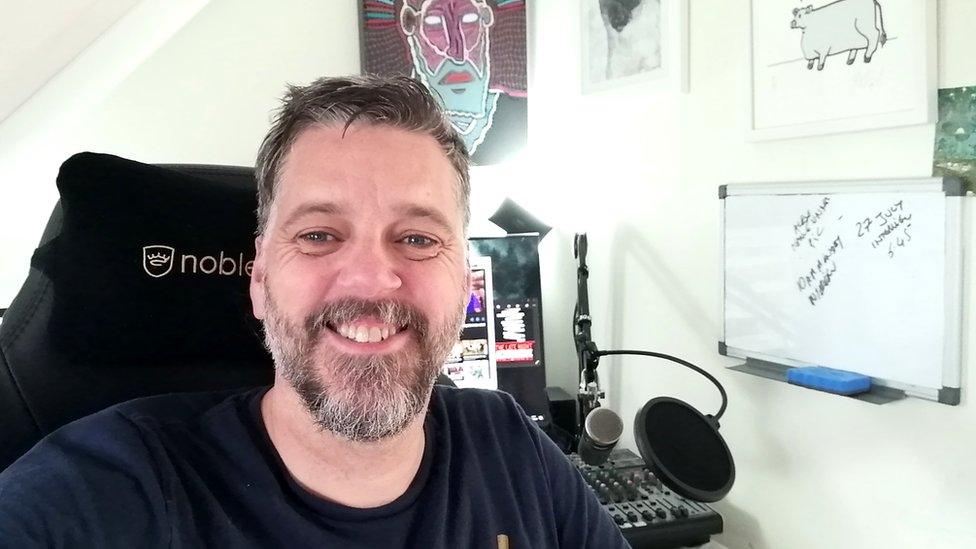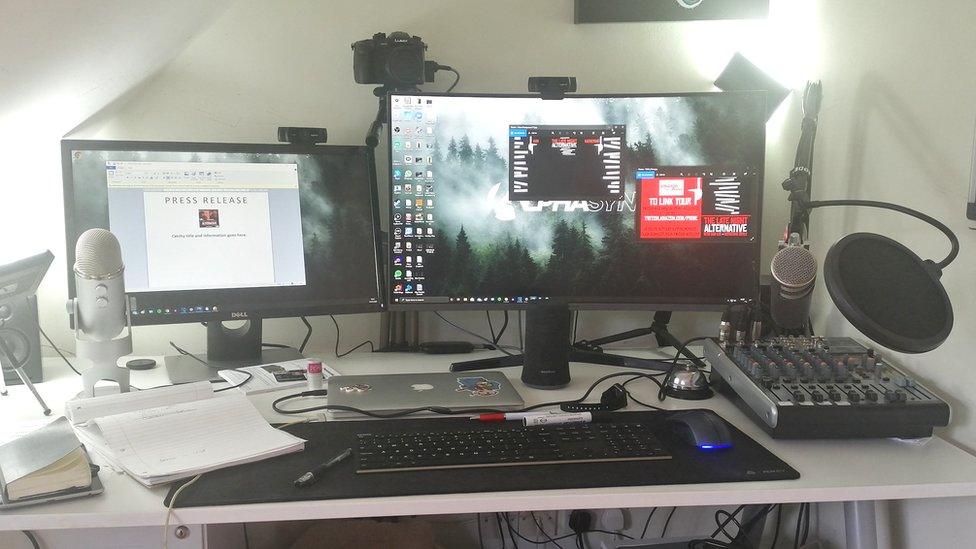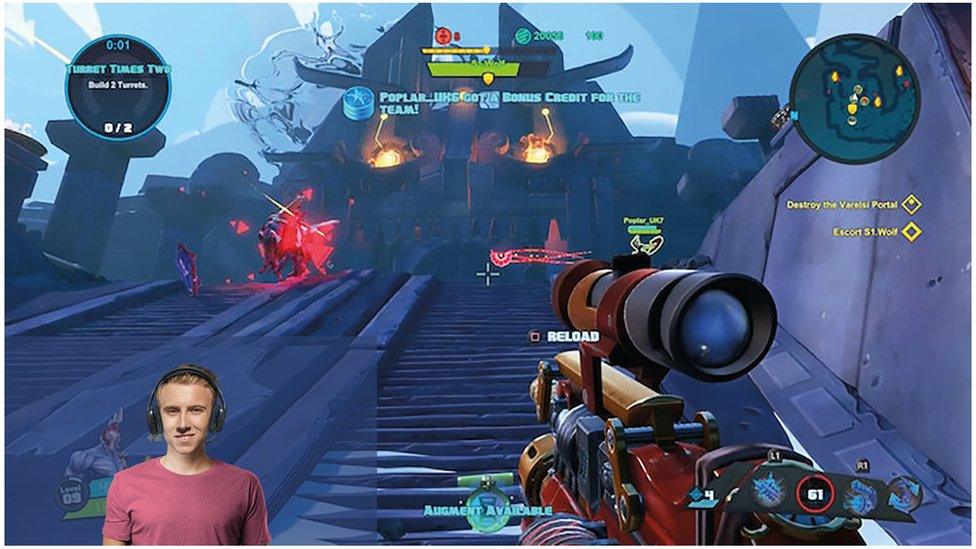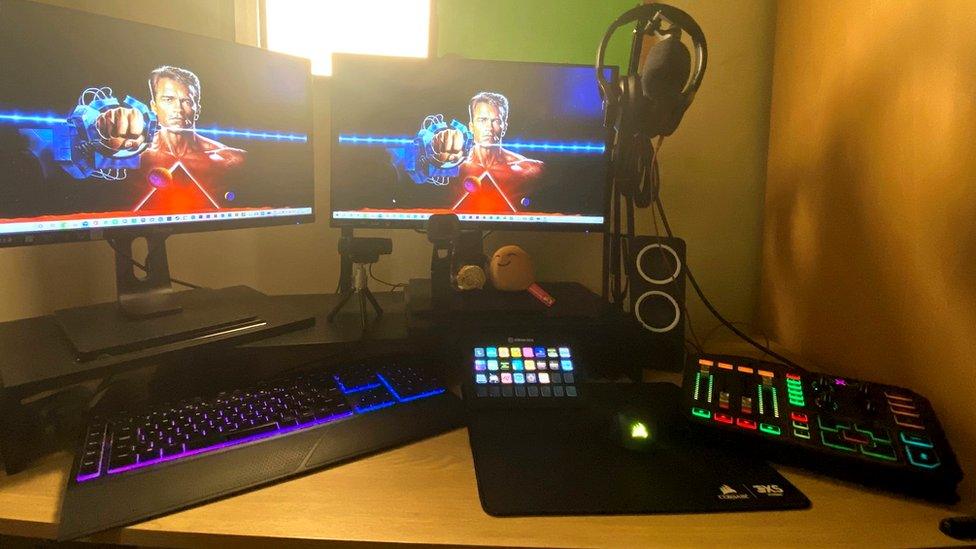What you need to become an internet streaming star
- Published

Iain Lee and his new studio
Via guesswork, Google and a bit of trial and error, Iain Lee thinks he has the right equipment to broadcast his new show with Katherine Boyle.
The show is not on the radio, instead the pair broadcast on Twitch, an internet-based service mainly used to watch people play computer games like Fortnite.
No longer just the host, Mr Lee is now the studio manager, camera and lighting operator, plus sound engineer who films, edits and mixes the show.
"I love doing the buttons and the faders and all the technical stuff. I don't understand it, but I'm a big fan of failure. And oh, do you feel alive when there's an audience and it's going wrong." says Mr Lee, who was once a BBC radio presenter.
The new show required some new equipment.
He had to buy a PC, because his iMac was not much good for playing games on. A decent camera was also purchased to stream live and record him and Katherine Boyle on their chat show, The Late Night Alternative, which launched earlier this month.

Iain Lee had to invest in new kit to get up and running
His Elgato game capture device will help broadcast his video game playing.
Another computer with pre-loaded sounds is attached to an audio mixer deck that also feeds into the PC.
But Mr Lee's favourite purchase is the £69 ($90) microphone arm. It is spring loaded, clips to the desk and swivels silently without bouncing.
"God, getting it was the sexiest moment of my life - apart from when I labelled plugs, recently," he jokes.
Mr Lee is getting kitted up because he has just joined 7.1 million other streamers who came to Twitch this past month, wanting to create TV from their own home.
Lockdowns flooded Twitch and has been a bonanza for any company that makes equipment to help streamers. They say sales have surged and demand has exploded.

Streaming computer games has become a big business
Some were waiting for this moment.
Computer accessories companies like Corsair and Logitech have been snapping up many of the smaller firms that make streaming related broadcasting equipment.
Over the last three years, Logitech, has acquired Jaybird headphones and Blue Yeti microphones. They have also nabbed gaming equipment and software companies like Streamlabs, Astro Gaming and Saitek.
Bracken Darrell, Logitech's chief executive, says that he realised streaming was a business opportunity the moment that customers began using their mice, keyboards and webcams to broadcast video games on YouTube.
Mr Darrell says the lockdown has helped people to find their voice and respond to what is going on in the world. He does not think things will return to normal.
"You can't put the genie back in the bottle," he says.
John Maier, the head of Blue Microphones agrees. Trends seen for years have been "hyper-charged".
"People want better sound, video, a better way to share - it all went through the roof as soon as people started to be at home," Mr Maier says.
On 21 July, Logitech reported a record 23% increase in sales to $792m (£622m).
Mr Darrell believes that the technology for streaming has a long way to go before it's for everyone.
"Our whole mission is to remove steps. So we're nowhere near the point where broadcast and streaming is easy enough. It's still way too hard, too complicated," he says.

Claire Lim playing 'Scottish Mum'
Broadcaster and popular Twitch streamer, Claire Lim, or "Wee Claire" as she's known on Twitch, initially found it difficult to broadcast while playing video games.
She started 18 months ago, playing Red Dead Redemption 2, while chatting via an old webcam.
"I kept falling off my horse, and then I ran over a dog with my horse. I killed it," she laughs. In between gaming, she began to introduce chatting sessions.
Now as a Twitch partner, she broadcasts on the platform full time, switching seamlessly between several different graphics backgrounds, mixing audio and calling out and reacting to her followers.
Ms Lim's show includes different characters and her graphics transform in order for her to have a rant as her character, "Scottish Mum".
She says that instead of a single TV show, she presents as if she were broadcasting an entire channel.
"I want my viewers to laugh, to enjoy their time with me. I want to give them a visual feast," she says.

Claire Lim's desk
For this, she uses a streaming deck from Elgato. A bit like a DJ booth for Twitch, its buttons activate stored zoom screens and alert sounds. Each press works like the audiovisual cue called by a TV director on a live show.
Elgato is another company, recently acquired by Logitech's competitor, Corsair, that has seen its fortunes benefit from the rise of streaming during lockdown.
Its products have been selling-out according to Julian Fest, the general manager for Elgato.
His father Markus Fest founded the company 20 years ago but it was around the time that Twitch began, in 2012, that Elgato entered streaming.


After he and his father found their software was being pirated, they contacted illegal downloaders to find out why they were stealing the product.
"And they all came back with the same response, oh, I'm recording my Xbox, I'm recording my PlayStation and uploading it to YouTube," says Mr Fest.
Instead of fighting them, they built a product based on their feedback. In 2018, Elgato was sold for an undisclosed amount and Mr Fest went with it to Corsair.
As for Mr Lee, he says the show is "going great guns" and the tech is holding up.
"Katherine and I are having fun learning in front of everyone and I think the audience like it. Why would anyone need to go to a studio to do a radio or TV show ever again? It just doesn't make sense anymore."